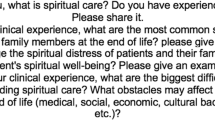Abstract
Nurses conduct physical and psychosocial assessments during admissions to healthcare facilities. Patients rely upon nurses to provide support and education during their journey, from periods of health decline to states of optimal wellness. Therefore, nurses are an ideal population to assess spiritual health. The value and necessity of spiritual assessment were explored on an inpatient unit providing medical and palliative care to patients. Two spiritual assessment tools, comprised each of five items, were evaluated by nursing staff and patients. Spiritual Assessment Tool 1 used language that was unaffiliated with religion, nor a belief in God, and Spiritual Assessment Tool 2 used language affiliated with faith and belief in God.
Similar content being viewed by others
References
American Nurses Association. (2001). Code of ethics for nurses with interpretive statements. Washington, DC: American Nurses Association.
American Nurses Association. (2003). Code of ethics for nurses with interpretive statements (2nd ed.). Washington, DC: American Nurses Association.
American Nurses Association. (2004). Code of ethics for nurses with interpretive statements. Washington, DC: American Nurses Association.
American Nurses Association. (2018). Scope of practice. Retrieved from https://www.nursingworld.org/practice-policy/scope-of-practice/ on March 31, 2018.
American Nurses Association of Colleges of Nurses. (2008). Essentials of baccalaureate education for professional nursing practice. Washington, DC: American Association of Colleges of Nurses.
American Nurses Credentialing Center. (2018). Certification. Retrieved from https://www.nursingworld.org/certification/ on March 31, 2018.
Birnbaum-Weitzman, C. E., et al. (2017). Validation of the functional assessment of chronic illness therapy-spiritual well-being-expanded (FACIT-Sp-Ex) across English and Spanish-speaking Hispanics/Latinos: Results from the Hispanic Community Health Study/Study of Latinos Sociocultural Ancillary Study. Psychology of Religion and Spirituality, 9(4), 337–347.
Cone, P. H., & MPhil-Giske, T. (2017). Nurses comfort level with spiritual assessment: A study among nurses working in diverse healthcare settings. Journal of Clinical Nursing, 26(19–20), 3125–3136.
Ferrel, B., Otis-Green, S., Baird, P., & Garcia, A. (2014). Nurses’ responses to requests for forgiveness at the end of life. Journal of Pain and Symptom Management, 47(3), 631–641.
Giske, T., & Cone, P. H. (2015). Discerning the healing path: How nurses assist patient spirituality in diverse health care settings. Journal of Clinical Nursing, 24(19), 1–10.
Haugan, G. (2014). The FACIT-Sp spiritual well-being scale: An investigation of the dimensionality, reliability and construct validity in a cognitively intact nursing home population. Scandinavian Journal of Caring Sciences, 29, 152–164.
Hayden, D. (2011). Spirituality in end-of-life care: Attending the person on their journey. British Journal of Community Nursing, 16(11), 546, 548–551. https://doi.org/10.12968/bjcn.2011.16.11.546.
Kannai, R., & Alon, A. (2017). To come full circle. Patient Education and Counseling, 100, 1619–1620.
Quality and Safety Education for Nurses. (2018). Competencies. Retrieved from http://qsen.org/competencies/ on March 31, 2018.
Ruth-Sahd, L., Hauck, C., & Sahd-Brown, K. E. (2018). Collaborating with hospital chaplains to meet the spiritual needs of critical care patients. Dimensions of Critical Care Nursing, 37(1), 18–25. https://doi.org/10.1097/DCC.0000000000000279.
Sessanna, L., Finnell, D. S., Underhill, M., Chang, Y. P., & Peng, H. L. (2011). Measures assessing spirituality as more than religiosity: A methodological review of nursing and health-related literature. Journal of Advanced Nursing, 67(8), 1677–1694. https://doi.org/10.1111/j.1365-2648.2010.05596.x.
The Joint Commission. (2018). The Source: For Joint Commission Compliance Strategies (Part 1. Body, Mind, Spirit: Hospital Chaplains Contribute to Patient Satisfaction and Well-Being). Retrieved from: https://store.jcrinc.com/assets/1/14/ts_16_2018_01.pdf
Vermandere, M., Warmenhoven, F., Van Severen, E., De Lepeleire, J., & Aertgeerts, B. (2015). The ars moriendi model for spiritual assessment: A mixed-methods evaluation. Oncology Nursing Forum, 42(4), E294–E301.
World Health Organization (WHO). (2020). Palliative care: Key facts. Retrieved October 30, 2020, from https://www.who.int/en/news-room/fact-sheets/detail/palliative-care.
Author information
Authors and Affiliations
Corresponding author
Additional information
Publisher's Note
Springer Nature remains neutral with regard to jurisdictional claims in published maps and institutional affiliations.
Rights and permissions
About this article
Cite this article
Green, C. Nurses and Patients’ Perspectives on Spiritual Health Assessment. J Relig Health 60, 122–133 (2021). https://doi.org/10.1007/s10943-020-01113-5
Accepted:
Published:
Issue Date:
DOI: https://doi.org/10.1007/s10943-020-01113-5




